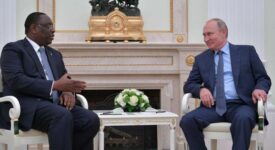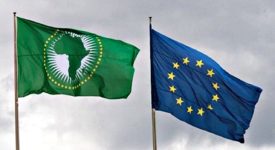The long-awaited EU-UK trade deal sealed just before Christmas and approved by the UK Parliament on Wednesday (30 December) gives Britain unprecedented market access to one of the world’s largest trading blocs – despite its messy divorce from Brussels. The agreement that smooths the way for both sides to trade with zero tariffs and zero quotas is still to be approved by the European Parliament over the coming days. As the clock struck 11pm in London on Thursday (31 December), the Brexit transition period came to an end and the UK exited the bloc’s single market and customs union. But the UK has left the European Union’s economic and political orbit in an historic departure that has split Britons politically and marked the country’s greatest shift on the global stage in modern times.
In stark contrast to UK Prime Minister Boris Johnson’s buoyant characterization of the country’s post-EU future, Ireland’s foreign minister Simon Coveney painted the UK’s departure as a source of regret. Brexit is “not something to celebrate”, Coveney declared, warning of trading disruptions due to fresh red tape. But on Friday, as the first ferries arrived in the Republic of Ireland from Britain under the new post-Brexit trade rules, events appeared to unfold smoothly and also the first ferries in and out of the port of Dover sailed uneventfully. Coveney also said there would be no additional checks on goods between Northern Ireland – which is staying in the EU’s single market, as well as applying EU customs rules at its ports – and the Republic of Ireland. Newly introduced checks on goods arriving in Northern Ireland from mainland Britain would be “as limited as possible”, he said. In France, President Emmanuel Macron used his New Year’s Eve message to take aim at Brexit, calling it the product of “lies and false promises”.
For observers of the Brexit process, the last four years have been an endless purgatory of political brinkmanship and negotiations with question marks on many issues still left unanswered, and hence the impact of its departure has yet to fully manifest itself on either side of the English Channel. For the major ports on Europe’s western shores – notably Antwerp, Rotterdam, Hamburg and Calais – the schism between the UK and the bloc has meant that meticulous planning for Britain’s eventual departure has been underway since the EU referendum result in June 2016. But while the deal has been hailed a success by both sides for the trade in goods, it offers scant comfort for the UK’s financial services sector and especially the City of London, the world’s second-largest financial hub. At Britain’s request, services were kept out of trade talks with Brussels to spur negotiators to forge a deal in a few months.
But the tactic has left the UK’s financial sector with only limited access to the EU market, which is worth around €33.2 billion a year. Since the June 2016 Brexit vote, financial firms in London have set up new offices in EU cities including Frankfurt, Amsterdam and Dublin and have moved a trillion pounds in assets to avoid major disruption. Before Brexit, Frankfurt was mostly focused on commercial banking, but the UK’s EU divorce has created an opportunity for the German city to become an investment banking hub. London still has a towering lead over rivals Frankfurt, Milan and Paris when it comes to trading stocks, currencies and derivatives, and playing host to asset managers. To help maintain London as a global financial center, Britain is allowing EU firms to stay for up to three years, in the hope they will apply for permanent UK authorization. Britain is also unilaterally allowing financial firms in the EU to offer selected services like credit ratings directly to British customers.
Meanwhile, a separate agreement signed between the UK and Spain will allow British territory to become part of the Schengen area. Thus, after some 300 years since Spain ceded Gibraltar to Britain in 1713, the fence that has divided two communities can now disappear. News that border controls for as many as 30,000 cross-border workers and tourists who shuttle through on a daily basis could be a thing of the past, following a last-minute New Year’s Eve deal between the UK and Spain, was met with wonder, relief and a heady dose of weariness on both sides of the fence in the southern tip of the Iberian peninsula. “It’s a historic day,” said Juan Lozano, the president of an organization that represents eight Spanish municipalities in the frontier area. “One that we’ll remember just as we remember the fall of the Berlin Wall in 1989.” While Spain has long sought to reclaim the territory, the border has at times become a pawn in the sovereignty dispute, most prominently in 1969 when the Spanish dictator Francisco Franco barricaded the border for 13 years.
Article Tags:
Boris Johnson · Britain · Emmanuel Macron · Ireland · Juan Lozano · Schengen · Scotland · Simon Coveney · UKArticle Categories:
INSTITUTIONS & POLICY-MAKING






